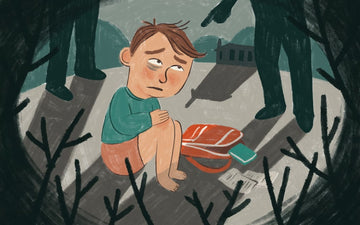A teenager, or teen, is a person who falls within the ages of 13 to 19 years old. Whereas preeteenager or tweenager is that stage of human development which follows early childhood and preceding adolescence The word "teenager" is another word for an adolescent. When a teenager turns 20, they are no longer a teenager: they are no longer in that developmental stage.
Now this may seem like a problem to most of the parents; an end to development after a certain age. But trust me it’s not. Setting some things in motion, at the right time can affect your child’s personality and eventually their life.

Getting the gist of the teenage behaviour
As we all know, teenagers are all about change. It's about transition. A child in preadolescent is not the same person he was just a year or two ago. He has changed—physically, cognitively, emotionally, and socially. He’s developing new independence and may even want to see how far he can push limits set by parents.
Dealing with a teenager is not easy. No matter how good a parent you are, and how great your relationship with your children, you are likely to face parenting roadblocks when it comes to teenagers. Behavior problems are common in teenagers. But you can deal with them with ease if you are willing to put in the effort to understand what they are going through and what it is that they need from you.

Diving deep into what influences teenage habits
It is normal for teenagers to be moody, because of the hormonal changes they go through. There are changes happening to the neural pathways in their brain and the ongoing growth of their body. At this crucial age, a lot of things tend to influence teenagers and not all of them can be termed as healthy.
In today's age of social media and information, more than 92% teens log into their social media accounts every day using their smartphones. Parents tend to get worried about the lifestyle and attitude changes that these communication devices bring with them.

A recently conducted study discovered that most teenagers would 'swipe past' health-related content that was not relevant to them, such as 'suggested' or 'recommended' content, deeming it inappropriate for their age group. They are more in awe of the celebrity-endorsed content and lifestyle. Rather than focusing on health, teenagers and preadolescents today think of this celebrity lifestyle as the kind of lifestyle that they are not living. This means most of them are vulnerable to celebrity influence.
The study also highlights that, the pressure of peers' 'selfies', which often strove for perfection, and the complex social implications of 'liking' each other's posts, were recurring themes in the young people's responses. Both of these activities had the potential to alter teenagers' health-related behaviors.

Handling Roadblocks:
It is very important for parents of teenagers & pre teens to understand their struggles, they need to try and understand the pressure put on children these days is much higher than it was before. Here are a few things for all parents to understand, learn & adopt while dealing with teenagers & pre teens to maintain balance and also to ensure they turn into good and dependable adults.
1. Accept and embrace their newly found independence.
It’s appropriate for kids this age to start turning away from their parents and relying more and more on friends, but parents need to understand this and not treat this as rejection.

2. Give it time.
It’s often tough to get pre-teens to open up and talk. But it’s important, even if they are reluctant to participate. Because, the quality time you spend with your kid is really the key. By giving their kids time (not by bombing them with questions), parents can not only improve their relationship but also teach their kids interpersonal skills that will be crucial in the future.

3. The feeling of home
You could ask you kids direct questions like “Tell me, what happened at school today? Or “Are the test results out?” But with the growing age, the approach needs to change. Kids need to feel that home is a place where they can come and talk, and they have permission to say anything that they’re thinking or feeling.

4. Why so Judgemental?
In their teenage years, children tend to pay attention to what you are talking about them, their friends, their habits or any other things closely related to them. They will be paying keen attention to the judgement you pass. They are watching and deciding whether you are harsh or critical or judgmental.

5. Don’t be afraid
The unfortunate reality is that with the newly found freedom, kids tend to exploit it. Absorbing bad habits from people they hang out with is pretty easy at this age, so firmly communicating the ill effects of something wrong they pick up becomes a necessity. Also, sexual development is a big part of this age, and it’s when we first start to see eating disorders arise, so these are key years for us to be building a strong foundation and giving them developmentally appropriate information. Making sure that the communication channel between you and your children is always open is important. They should feel like they could come and consult & talk to you at any point about anything.

Behavioral changes are common in teenagers. Whether you have a teenage boy or girl, knowing what is normal and what is not can help you deal and interact with them appropriately and build a cooperative relationship that benefits both of you. You can do kids shopping online and make them happy by surprising them with amazing clothes.






